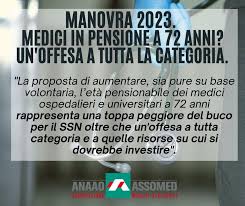With some amendments of the majority deposited and reported in the decree One thousand extensions rispunta l’ipotesi di alzare l’età pensionabile dei medici a 72 anni, già bocciata nella Manovra di fine anno. Per uno degli emendamenti la pensionabilità a 72 anni potrebbe essere facoltativa. Alla base l’obiettivo di far

“Misura utile solo a favorire determinate lobby”, commenta su “Il Secolo XIX” il segretario nazionale Anaao Assomed Pierino Di Silverio sottolineando che “si cerca di far rientrare dalla finestra ciò che era uscito dalla porta principale”.
Secondo il segretario generale del Sindacato Medici Italiani (Smi), Pina Onotri, “non sono queste le soluzioni per risollevare le sorti della medicina di prossimità. Non servono misure tampone che penalizzano ancor di più i medici, in fuga, ormai, dal Ssn per i carichi di lavoro insopportabili e per le retribuzioni in caduta libera”.
Mostly SNAMI the proposal is unacceptable, it would be an even worse solution than the flaw it is intended to remedy
Favorevole invece il segretario generale della Federazione dei medici di medicina generale (Fimmg), Silvestro Scotti, “per quanto possa sembrare paradossale ritengo questa possibilità favorevole anche per i giovani”.
The FNOMCeO is more open to the condition that it is a temporary provision. In this regard he published a communicated which we quote from the title:
Doctors retiring at 72? Rings (FNOMCeO): “Ineffective measure, but lesser evil. Structural reforms are needed, investing in professionals"
“Doctors retiring at 72? If the intention is to fill the staff shortage, it is an ineffective measure. The real solution is to make the system attractive”.
“If instead the goal – he adds – is to give the system a shot in the arm, while waiting for the new specialists and general practitioners who have trained thanks to the increase in scholarships to arrive in three or four years, the measure may make sense. In any case, an over seventy-year-old doctor, but qualified and experienced, is better than a non-EU doctor hired without certainty of his qualifications, knowledge of the Italian language and not registered with our Orders, or another professional set to do the job of a doctor ”.
A kind of "lesser evil”, therefore, which according to the President of FNOMCeO can be accepted, under specific conditions: “the temporariness, the voluntariness, and the commitment to improve, in these three years, the working conditions of doctors, in the hospital and on the territory”.
“Making doctors work beyond the age of seventy cannot become normal" explains Rings, who already in 2018, with the communication campaign on "centenary doctors", prophesied the situation. “The paradox of colleagues with wrinkled faces who, in white coats, looked at us from posters in our streets and squares, was intended to sensitize public opinion and politics to the risk that, shortly thereafter, there would no longer be doctors at heal us. Now the fiction has dramatically become reality and we can't look the other way".
FNOMCeO Press and Information Office
information@fnomceo.it
www.fnomceo.it
23/01/2023
